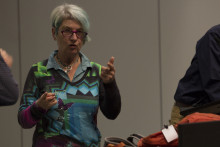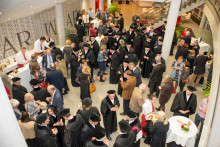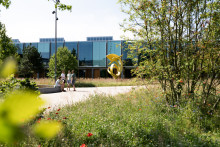The volunteer who tried to mimic a bat, serves as an introduction to how we define consciousness. ‘Although you gave a great performance for a human,’ Blackmore says,’ I think we can all agree that you are not a bat. So, how do we define the consciousness of a bat? Or how about this water bottle?’ She presses the bottle to her ear. ‘I think this bottle is having a grumpy day, because it is not responding.’
Are you conscious right now?
Blackmore continues her lecture with the question: ‘Are you conscious right now?’ Most people immediately raise their hand. But when Blackmore subsequently asks: ‘What does it mean to be conscious and what were you conscious of just a moment ago?’, silence reigns.
Blackmore doesn’t have an answer to this question either. ‘I don’t want you to leave this lecture with new information,’ she says. ‘I want you to leave with a feeling of confusion and bewilderment.’
Week of Inspiration
The Week of Inspiration takes place from the 20th of November to the 24th. This year’s central theme is: What are the foundations of our life? Apart from several lectures, there are also interactive workshops that you can take part in. Subjects range from fundamental science and technology to more abstract and philosophical topics, of which Blackmore’s lecture is a prime example.
Visualizing your brain
The lecture becomes more scientific when Blackmore shows us an experiment from scientists at the University of California. By measuring brain activity while someone was watching movie trailers, they could reconstruct a visual image based on brain activity alone. ‘Imagine a future,’ Blackmore says, ‘where you forgot what you dreamed about, but using a machine you can find out.’
Blackmore concludes: ‘While neuroscience can be used to visualize our brain activity, it cannot explain what we are conscious of or what consciousness is. Therefore, consciousness is an illusion. Note that I use the definition from the dictionary here. I am not saying that consciousness does not exist, but merely that it is a deceptive and misinterpreted phenomenon.’







